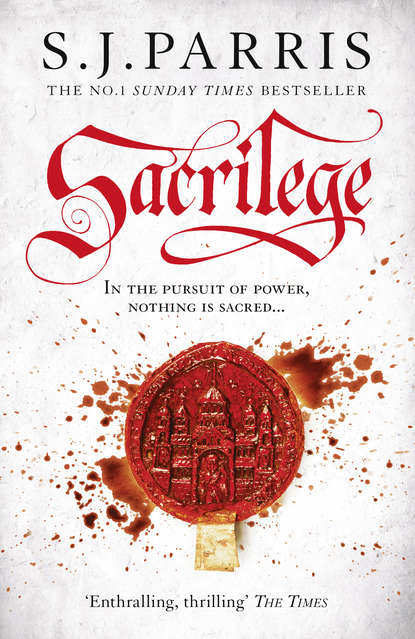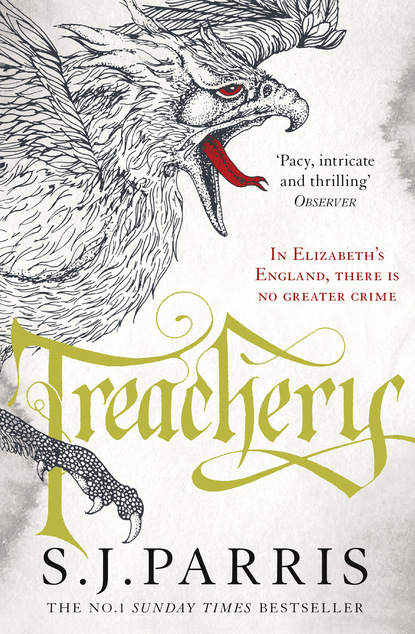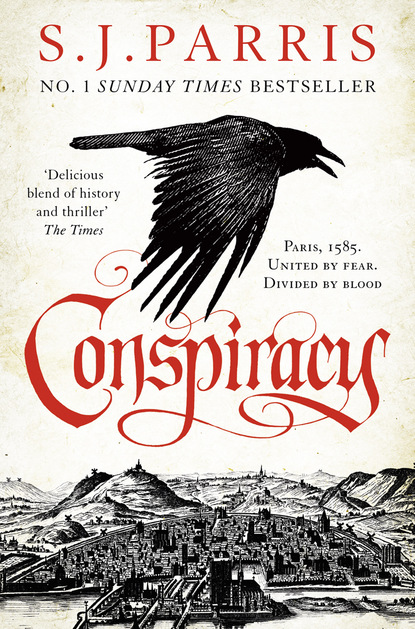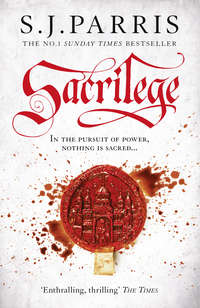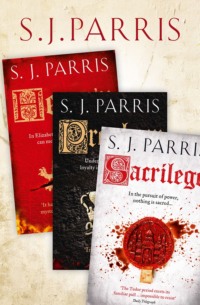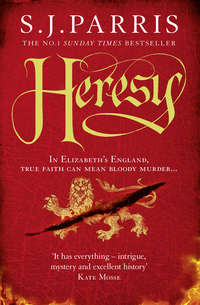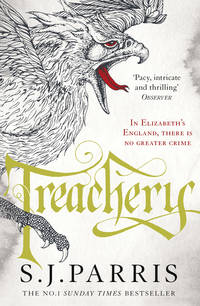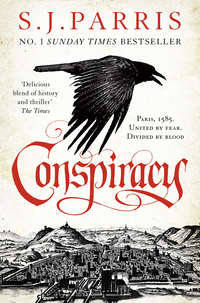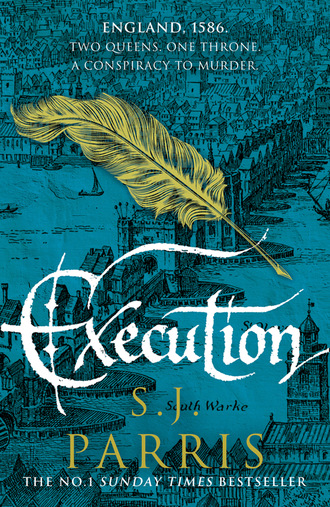
Полная версия
Execution



Copyright
HarperCollinsPublishers Ltd
1 London Bridge Street
London SE1 9GF
www.harpercollins.co.uk
First published in Great Britain by HarperCollinsPublishers 2020
Copyright © Stephanie Merritt 2020
Prelims show ‘MS 4769f.1 Execution Warrant for Mary Queen of Scots, 1587 (ink on paper)’ © Bridgeman Images
Cover design by Holly Macdonald © HarperCollinsPublishers 2020
Cover images (front) © Lebrecht Music & Arts / Alamy Stock Photo (Elizabethan drawing), (back) © Interfoto / Alamy Stock Photo (warrant to execute Mary Queen of Scots), Shutterstock.com (all other images)
Stephanie Merritt asserts the moral right to be identified as the author of this work
A catalogue record for this book is available from the British Library
This novel is entirely a work of fiction. The names, characters and incidents portrayed in it are the work of the author’s imagination. Any resemblance to actual persons, living or dead, events or localities is entirely coincidental.
All rights reserved under International and Pan-American Copyright Conventions. By payment of the required fees, you have been granted the non-exclusive, non-transferable right to access and read the text of this e-book on-screen. No part of this text may be reproduced, transmitted, down-loaded, decompiled, reverse engineered, or stored in or introduced into any information storage and retrieval system, in any form or by any means, whether electronic or mechanical, now known or hereinafter invented, without the express written permission of HarperCollins e-books
Source ISBN: 9780007481293
Ebook Edition © April 2020 ISBN: 9780007481316
Version: 2020-02-24
Epigraph
For the dispatch of the usurper, from the obedience of whom we are by excommunication made free, there be six gentlemen, all my private friends, who for the zeal they bear to the Catholic cause and your majesty’s service, will undertake that tragic execution.
Letter from Anthony Babington to Mary, Queen of Scots, 6th July 1586
Contents
Cover
Title Page
Copyright
Epigraph
Execution Warrant
Prologue
Part One
Chapter One
Chapter Two
Chapter Three
Chapter Four
Chapter Five
Chapter Six
Chapter Seven
Chapter Eight
Chapter Nine
Chapter Ten
Chapter Eleven
Part Two
Chapter Twelve
Chapter Thirteen
Chapter Fourteen
Chapter Fifteen
Chapter Sixteen
Chapter Seventeen
Chapter Eighteen
Chapter Nineteen
Chapter Twenty
Chapter Twenty-One
Chapter Twenty-Two
Chapter Twenty-Three
Chapter Twenty-Four
Chapter Twenty-Five
Chapter Twenty-Six
Epilogue
Keep Reading …
About the Author
Also by S. J. Parris
About the Publisher
Execution Warrant
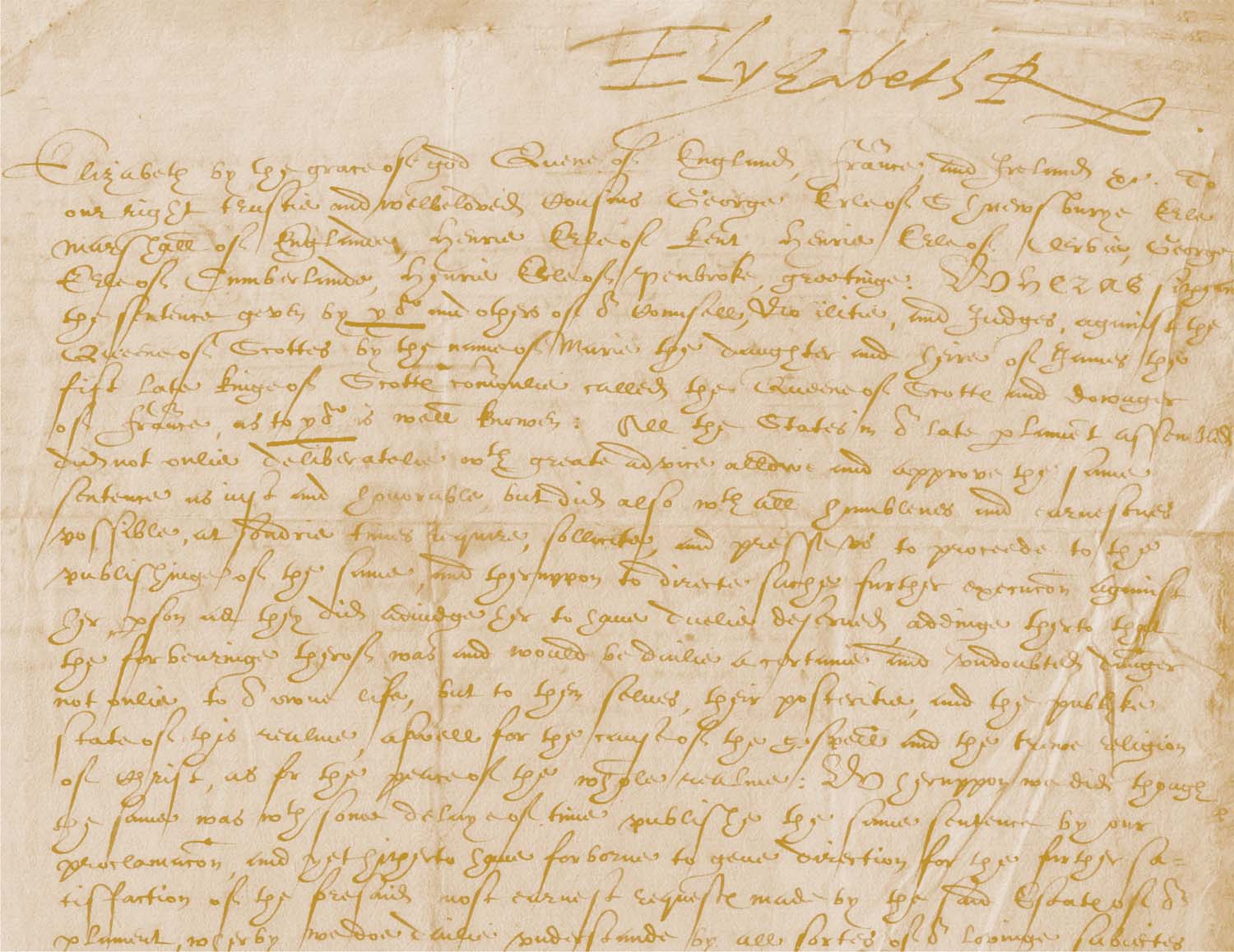
PROLOGUE
17th July 1586
Chartley Manor, Staffordshire
Six gentlemen. Six of them, ready to undertake that tragic execution in her name. She smiles at the euphemism. But then: why not call it that? Elizabeth Tudor is a heretic, a traitor and a thief, occupying a throne she has stolen; dispatching her would be no regicide, but a just and deserved punishment under the law. Not the law of England, to be sure, but God’s law, which is greater.
Mary sits at the small table in her room, in her prison, thinking, thinking, turning over and over in her mind the pages of the great ledger of injustices heaped against her. Eventually, she dips her quill in the inkpot. She wears gloves with the fingers cut off, because it is always cold here, in Staffordshire; the summer so far has been bleak and grey, or at least what she can see of it from her casement, since she is not permitted to walk outside. She flexes her fingers and hears the knuckles crack; she rubs the sore and swollen joints. A pool of weak light falls on the paper before her; she has havered so long over this reply that the candle has almost burned down, and she only has one left until Paulet, her keeper, brings the new ration in the morning. Sometimes he pretends to forget, just as he does with the firewood, to see how long she will sit in the cold and dark without protesting. And when she does ask meekly for the little that is her due, he uses it against her; charges her with being demanding, spoilt, needy, and says he will tell her cousin. But should a queen plead meekly with the likes of Sir Amias Paulet, that puffed-up Puritan? Should a queen be starved of sunlight, of liberty, of respect, and endure it with patience? Twenty years of imprisonment has not taught her to bear it any better, nor will she ever accept it. The day she bows to their treatment of her, she is no longer worthy of her royal title.
She sets the quill down; she has worked herself into a fury and her shaking hand has spattered ink drops on the clean page; she will have to begin again, when she is calmer. She pushes back the chair and heaves herself with difficulty to her feet, wincing at the pain in her inflamed legs. Each step to the window hurts more than it did the day before; or perhaps she is imagining that. One imagines so much, cooped up here in these four walls. She smooths her skirts over her broad hips; and there is another injustice, that she should still be fat when she eats so little! She doesn’t trust the food they bring; one day, she is certain, she will eat or drink something and not wake up. That would suit her cousin Elizabeth very well, so she will not give her the satisfaction. And yet, Mary thinks, curling her lip at her rippled reflection in the dark of the windowpane, she has grown heavy and lumpen on nothing but air, half-crippled by rheumatism, grey and faded, an old woman at forty-four. No trace left of the famous beauty that once drove men to madness. But Elizabeth is ugly too, she has heard; near-bald, teeth blackened, her skin so eaten away by the ceruse she uses to hide her age that she will not be seen by any except her closest women without a full mask of face-paint. There will be no children for her now; at least that is one contest that Mary can say she won, even if she hasn’t seen her son for nearly twenty years.
She cups her hands around her face to peer out at the night, watching a barn owl ghosting over the moat, when there is a soft knock at the door. She starts, hastens back to the table to hide the papers, but it is only Claude Nau, her French secretary. He bobs a brief bow, takes in her guilty expression.
‘You are writing him a reply, Your Majesty?’
‘I am considering.’ She draws herself up, haughty. He is going to tell her off, she knows, and she has had enough of men speaking to her as if she is a child. She is Queen of Scotland, Dowager Queen of France, and rightful Queen of England, and they should not forget it.
‘I counsel against that.’
She watches Nau; a handsome man, always quietly spoken, infuriatingly self-contained, even when she works herself into one of her fits of passion.
‘I know you do. But I make my own decisions.’
‘Majesty.’ He inclines his head. ‘I smell a trap.’
‘Oh, you will see conspiracies everywhere. Did you read what he promises, Claude? He has men to do the deed, and earnest assurance of foreign aid, and riders to take me to liberty. Everything is in place.’ She allows herself to imagine it, as she has so many times, crossing back to the window. ‘See, I have an idea’ – she taps the glass, excited – ‘if we know the exact date to expect him, we can have one of the servants start a fire in the stables. Everyone will rush out and in the commotion, Anthony Babington and his friends can break down my chamber door and whisk me away.’ She spins around, a wide, girlish smile on her face that fades the instant she sees his look. ‘What? You do not like my plan?’
‘It is a very good plan, Majesty. Only …’ He folds his hands.
‘Speak.’
‘We have heard such promises before. This Babington is proposing an assassination.’
‘Execution.’
He waves a hand. ‘Call it what you will. But your own cousin. England’s queen. In your name.’
‘She is no queen.’
He adopts the patient, pained expression that so irritates her. ‘Of course not. But if you agree to their proposal, if you so much as acknowledge it in writing, you make yourself an accessory to treason, and there is only one punishment for that offence.’
‘My royal cousin loves me too much to allow that.’
‘She loves you.’ Nau does not contradict her outright, but he allows his gaze to travel pointedly around the room in which she is held captive.
Mary’s eyes flash; he has overstepped the mark. ‘Leave me.’ She flaps a hand to the door. ‘I have my letter to write. Come back in an hour and you can encrypt it.’
‘I implore you not to put anything on paper which would implicate you in this reckless business. Babington and his friends are impetuous boys. We would do better to proceed with caution, keep our options open.’
‘And I order you to get out. There is no we here, Claude. They are my options, and I will choose. Obey your queen.’
Nau sighs audibly, bows, and backs out of the royal presence. When the door clicks shut behind him, Mary smiles, pleased with herself. She sits again at the table and dips her quill, but she cannot think how to begin. She wants Elizabeth to love her, it’s true. She wants Elizabeth dead. She wants only her freedom; she wants the throne of England. She is ill, and desperate, and ready to clutch at any straw Providence tosses her way.
She glances up and sees her embroidered cloth of state hanging on the wall over her bed. Every time the snake Paulet comes into the room, he rips it down – she is not permitted the trappings of a queen, he says. And every time he leaves, her women patiently gather it up, mend the tears and hang it again. Now, this Babington is offering her the real prospect of seeing it where it belongs, above her throne at last. She has waited long enough. She is done with caution. What she wants at this moment, more than anything, is to win.
She takes a fresh sheet of paper and writes the date: 17th July 1586. It is a letter that will kill a queen.
ONE
27th July 1586
I am not a praying man. Thirteen years as a Dominican friar cured me of that habit, forgive the pun. But in certain situations the old instincts triumph over reason; in the teeth of mortal terror, I often find my lips forming the familiar Latin incantations before my mind has even noticed. I could wish it didn’t happen; it seems disrespectful to the God I no longer believe in that some primitive part of my soul clutches at him like an infant only when I fear I am staring Death in the face, and though I willingly admit to many faults, I hope hypocrisy is not one of them. But perhaps it is only confirmation that you can never erase your past, no matter how far you try to run from it. I had caught the boat from France that summer of 1586 in the hope of finding a place of refuge. Instead – though I didn’t yet know it – I had set a straight course towards a murderer.
Pater Noster qui es in caelis, sanctificetur nomen tuum—
Another wave higher than a house loomed over the small fishing vessel, tipping us so that everything not lashed to the deck slid downward and I grabbed at the rail with numb fingers to avoid being flung into the white spray as it broke. The men grappling with the sail barked frantic orders to one another in English; I could not make out the words over the roar of the wind, but the alarm in their voices was clear enough in any language. The wave lifted the boat, allowing it to teeter for a moment on the crest, before dropping us with a thud into a trough between swelling blue-black peaks. On the next rise, I confirmed what I thought I had seen before: a wavering pinprick of light and a dark spine of shadow along the horizon.
‘Is that the port?’ I shouted. The captain shook his head, cupping his hand to his ear. I risked peeling one hand from the side to point. ‘That light – is that Rye?’
‘Rye,’ he yelled back, following my finger and nodding vigorously. He pushed aside the wet hair plastered to his forehead; like the rest of us, he was soaked through from the salt spray. I was shivering so hard I had almost lost all feeling, my teeth rattling so that I feared I might bite off my tongue. The tiny dot of light from the harbour beacon did not seem to be getting any closer, no matter how the boat pitched and rolled; I felt as if we had been crossing the Narrow Sea for days, though it could only have been a matter of hours since we left France, under cover of darkness. ‘You’d do better below deck,’ he added, pointing to the hatch.
‘I assure you I wouldn’t,’ I shouted back, though I was sure he couldn’t hear. Below deck the half-digested remains of my supper still decorated the timbers. At least here I could see the horizon, and breathe air that smelled slightly less violently of fish. I had always confidently imagined myself at home on boats but the wind was high tonight, the swell vicious, and the last time I had sailed along the English coastline it had been on a galleon belonging to Sir Francis Drake’s fleet, solid as a cathedral compared to this fishing vessel that felt with every wave as if it were a toy hurled by a petulant child. But I had embarked on this journey with no time to make preparations, and the captain was well paid to be quick and discreet.
‘How long?’ I yelled, pointing to the beacon as the boat rolled and the light dipped out of sight. He shot me an impatient glance and lifted one shoulder.
‘Depends on the wind. If you’re going to void again, stay out the way.’
I shuffled back and sat down on a coil of rope, clinging to the side of the craft with both hands, absently muttering another Pater Noster as we lurched starboard and a wave slapped over the deck to drench my feet. I was fairly sure I had nothing left in my stomach to bring up after this crossing, but I had thought that the last time I vomited, and the time before. My guts were roiling, my hands and feet raw with cold, eyes stinging from the wind, but my spirits surged each time I spotted that elusive light appearing and vanishing at intervals as the waves obscured it. For months I had waited in hope of the chance to return to England while I marked time in Paris, uncertain as to what direction my life should take next. But without a summons from the one man in London who could change my fortunes, there had been no prospect. An Italian like me could hardly turn up without a reason; the English had a deep-rooted suspicion of foreigners at the best of times, and in these days of religious unrest anyone looking and sounding as I did would be assumed to be Spanish, part of a Catholic plot, or a secret priest. Now I was within sight of Rye harbour, and in my pack below deck, safely wrapped in watertight leather, I carried a currency more valuable than an invitation: new information. The look on Sir Francis Walsingham’s face when he read the letter I brought would be worth all the discomforts of this journey. He would see, beyond doubt, what I was willing to risk to protect England. But first I had to find a way to put it into his hands.
It took the best part of an hour battling the wind and tide before the boatman steered us into the channel of Rye port where the water lay calmer and I was able to let go of the boat’s rail and attempt to stand on my feet. Thin mists of drizzle hung over the harbour basin. We pulled up alongside a flight of steps set in the quay wall, where one of the men flung a rope around a wooden post to hold us steady as I disembarked. I shook the owner’s hand; he gave a curt nod and wished me luck. Though he didn’t know my name or the nature of what I carried, he knew who had sent me and could guess at my purpose. I hoisted my bag and lurched with trembling legs on to the steps where I almost slipped, a misstep that would have sent me and my precious cargo tumbling into the black water below. Clutching at the frayed rope nailed along the wall, I righted myself to climb with excessive care to the top and into the waiting arms of two men with lanterns.
‘You best come with us.’ The one who had spoken gripped me by the upper arm, firmly enough to make himself clear, and began marching me towards a row of low buildings at the end of the quay. The second man, tall with a prominent Adam’s apple, wrenched my bag from my shoulder and jerked it between his hands, as if assessing its weight.
I tried to appear pliant; I had expected this. In the half-light I could not see if they were armed, though I guessed they must be. In any case, I could barely make my legs move after the voyage; I could not have looked like much of a threat.
‘I need to see Richard Daniel,’ I said. My teeth were chattering so violently I could barely get the words out.
Adam’s Apple made some noise that I supposed was a mocking attempt at my accent. ‘Sorry, mate – you’ll have to say that again in English.’ He exchanged a smirk with his colleague.
I fought down my impatience. Deference was the only way through with men like this, puffed up with their tiny scrap of power.
‘Richard Daniel,’ I said, slowly and clearly. ‘I was told to ask for him when I arrived.’
‘He’s tucked up in bed at this hour,’ said the short man, turning to face me. He had a pronounced squint in his left eye. ‘You’ll have to deal with us.’
‘Then wake him.’
It was the wrong tone; he tightened his grip on my arm.
‘You don’t give orders here, you fucking – what are you, bastard of a Spanish whore?’
‘I am Italian. But—’
I was pushed inside the door of a building with a fire burning in a small grate, filling the room with smoke.
‘What’s your name?’ Squint asked. From the tail of my eye, I could see the other one bending to open my pack.
‘I am Doctor Giordano Bruno of Nola,’ I said, drawing myself up and attempting a show of dignity. ‘Who are you?’
‘I’m the law,’ he said, stepping closer, a grim smile showing his remaining teeth.
‘Well, I will need a name to give Queen Elizabeth’s Secretary of State when I complain of how I was treated on arrival.’
Adam’s Apple stopped rummaging and raised his head; an anxious glance flitted between them.
‘Tell the Queen in person, why don’t you,’ said Squint, though he looked less sure of himself. ‘We’re only doing our job. You fetch up here in the dead of night, trying to sneak into the country, you couldn’t look more like a bloody priest if you tried.’
‘Then don’t you think they would send someone less obvious? If I was trying to land unnoticed I would hardly come direct to the port.’
‘You’re bound to say that,’ said Adam’s Apple, crouching on the floor beside my bag. ‘You’d be amazed what we find sewn in the linings of coats and hidden in false compartments. Priests’ vestments, holy oil, saints’ fingers – those are a favourite. Papal bulls, even.’
‘There are no fingers in my belongings except yours,’ I said. ‘If you would just fetch Master Daniel, I could explain my business. Here—’ I reached inside my doublet but before I could bring out the object I meant to show him, I felt a blow to the back of my knees; my legs crumpled and I crashed to the ground as the squinting man straddled me, pulling my left arm up behind my back.
‘Madonna porca – what are you doing?’ His weight mashed my face into the packed earth floor; I struggled to push him back enough that I could breathe.
‘He was drawing a weapon,’ the searcher told his colleague, who had leapt to his feet ready to join in.
‘I have no weapon in my doublet,’ I said, through clenched teeth. ‘I only meant to show you something that might make you believe me.’
The man considered for a moment, before shifting off me, loosening his grip. ‘Hands on the back of your head,’ he barked, ‘and stand slowly. I’ll see for myself if you’re armed.’
I folded my hands behind my head and rose to a crouch, my back to him. I could see them both from the corner of my eye, hovering, waiting for the smallest excuse to swing a fist at me, or worse. I began to turn; in one swift movement I bent, whipped out my dagger from the side of my boot and brought the point to the soft, pulsing skin between Squint’s collarbones.
‘I could cut his throat before you’ve even thought about drawing your knife,’ I said to Adam’s Apple, who froze, backing away, one hand to his belt. ‘Now go and wake Master Daniel as I asked so we can all be on good terms again.’ I flashed him a pleasant smile; he hesitated only briefly before lunging for the door. ‘Why don’t you put your hands on the back of your head?’ I said to my captive. He glowered at me, but obeyed.
‘You won’t get away with this,’ he muttered. ‘We broke from Rome to keep people like you out.’
I let out a soft laugh. There was nothing to be gained from trying to debate with men who thought like this.
‘What a curious race you are, you Englishmen,’ I mused, my dagger level at his neck. ‘I never met a people who complained so bitterly about their country and at the same time believed themselves the superiors of every other nation in Europe, just because God saw fit to surround you by sea.’
‘It’s well known Italians are all sodomites,’ he said, though quietly. I laughed again; I almost admired his defiance.
‘Is that right? You must be nervous, then, the two of us alone here.’ He took a step back, struggling to control his expression. I matched his movement. ‘Careful you don’t back yourself into a corner – who knows what I might do? And tell me – what of the Spanish?’
‘Don’t even get me started on the Spanish.’ His squint intensified as his eyes grew animated. ‘They want to invade us and rape our women, make us slaves to kiss the Pope’s hole. You’re all the bloody same.’
‘It’s a wonder you can tell us apart,’ I said. ‘You must enjoy your work here.’ My hand was shaking with cold; I had to concentrate hard on keeping the knife steady so that I didn’t cut him by mistake. I had no intention of causing more trouble than necessary.
He puffed himself up, despite the blade. ‘My work is keeping England safe from the likes of you. And I am proud of that, yeah. Means I can look my son square in the eye when I go home, tell him he’ll grow up a free Englishman.’
‘Good for you. It must be quite a feat for you to look anyone square in the eye.’
I gave him a sympathetic smile, seeing how much he wanted to hit me. I was half-tempted to tell him of my own work, let him appreciate the irony, but I restrained myself; the truth about my journey was for Richard Daniel only. Squint subsided into silence, shooting me furious glances from the side of his good eye. I considered soliciting his view of the French, but I was too tired and the game had lost its amusement.


